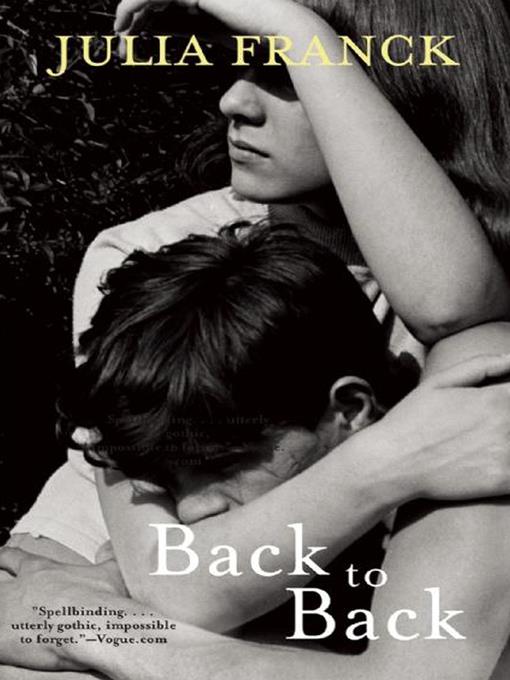
Back to Back
- اطلاعات
- نقد و بررسی
- دیدگاه کاربران
نقد و بررسی

Starred review from September 30, 2013
Set in East Germany during the 1950s and ’60s, this haunting novel depicts the constricted, oppressed lives of people living under the brutal policies of country’s Communist government. We meet two pre-adolescent siblings who endure unremitting sorrow, loneliness, privation, humiliation, and physical pain, until one dies at age 19. Thomas and Ella are little more than slaves to their mother, Käthe, a sculptor with a massive ego and deluded ideas about the triumph of the workers in the class struggle, while she herself lives in bourgeois comfort. Franck—whose previous novel, The Blindness of the Heart, was a bestseller in Germany—mirrors the corrupt and hypocritical policies of the state through Käthe’s behavior. Supposedly to instill independence, she subjects her children to verbal and physical abuse, a workload of daily drudgery, and cruel punishments. Meanwhile she ignores the evidence that Ella is being raped by the lodgers who live with them. Sensitive, poetry-writing Thomas feels despair at his inability to break free of his mother’s domination and the oppressed society behind the Berlin Wall. Käthe is a despicable character whose monstrous behavior makes the reader squirm, but she’s the novel’s potent force. Moreover, Franck’s acknowledgement that the anguished poems quoted in the text, supposedly written by Thomas, are from the estate of a man with the Franck surname, invests this narrative with heartbreaking reality.

October 1, 2013
A devoted brother and sister suffer their mother's pitiless love and the even harsher treatment of the state, East Germany in its formative years, in a relentlessly dark second novel from a prize-winning Germany writer. After the international success of her bleak yet striking English language debut (The Blindness of the Heart, 2010), Franck returns with another brutal vision of history glimpsed through the family, this time set behind the Iron Curtain. Ella and Thomas are two of the neglected children of a sculptor who is passionate about the poor and her art but callous toward her own brood, whom she neglects, abandons for weeks at a time, criticizes and humiliates. Although the strong bond between Ella and Thomas helps them endure, their futures are doomed. Ella is raped both by her stepfather and the lodger, a State Security officer, is hospitalized and never fully recovers. Thomas, sensitive and intelligent but denied the education and freedom he craves, is sent to labor in a quarry where the abuse and bullying nearly destroy him. Later, working in a hospital, he meets and falls in love with a nurse whose life is as impossibly painful as his own. Through intense, impressionistic, often beautifully detailed strands of narration, Franck spins a terrible sequence of damage and unhappiness. Poetic and sensuous, but so unrelievedly grim that it borders on the unendurable.
COPYRIGHT(2013) Kirkus Reviews, ALL RIGHTS RESERVED.

Starred review from November 15, 2013
The personal and the political intertwine in this novel of fractured childhood in East Germany. Headstrong Ella and her sensitive brother, Thomas, are variously abused and neglected by their mother, Kthe, a sculptor whose zeal for the newborn socialist state is surpassed only by her relentless careerism. In their run-down estate on the frigid Mggelsee, Thomas models nude for his mother and dreams of being a writer but is sent off to work in a rock quarry, while Ella hides under the bed in a futile effort to avoid being molested by a secret agent that the family has taken in as a lodger. The Berlin Wall goes up, and lives fall apart; heartbreak ensues. As she did in the acclaimed Blindness of the Heart (2010), Franck mines her family's past for inspiration: Kthe may be a personification of the cruel idealism of the German Democratic Republic, but she is also modeled after the author's grandmother, artist Ingeborg Hunzinger, and fragments of Thomas' poetry scattered throughout the novel are attributed to Franck's uncle, a young suicide. There is no Ostalgie here, just a powerful elegy.(Reprinted with permission of Booklist, copyright 2013, American Library Association.)

July 1, 2013
Franck's first publication in this country (2010) was the German Book Prize winner The Blindness of the Heart, which has appeared in 35 countries; it received significant review and off-the-bookpage attention here. Her second U.S. publication opens in East Berlin in 1954 and features Kathe, a sculptor of Jewish descent who raises her children in hard-nosed Socialist fashion. But Thomas and Ella long for the West, where their father has fled. Furthermore, Ella is being abused by the family's Stasi lodger, which adds psychological drama to Franck's intense study of the relentless forces of history. Great for elevated book club discussion.
Copyright 2013 Library Journal, LLC Used with permission.




دیدگاه کاربران